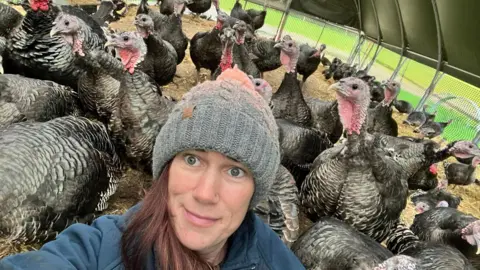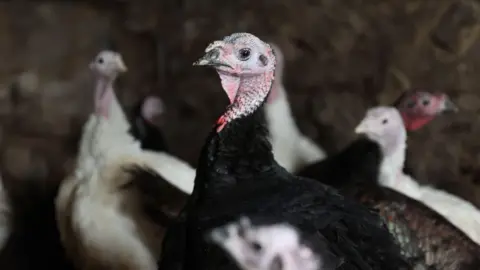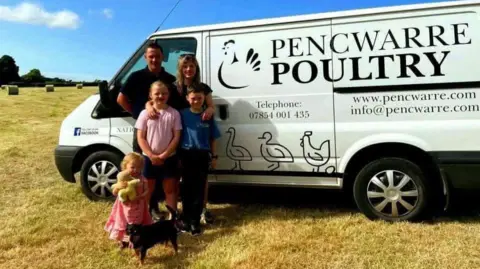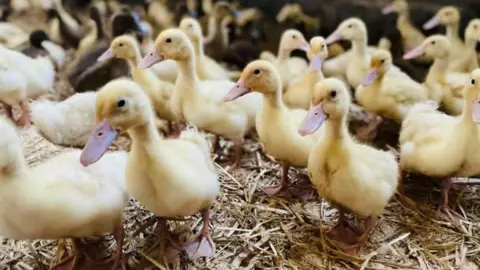If our birds get avian flu I don't see a way back for us
 Postance Poultry
Postance PoultryA poultry farmer fears there would be "no way back" for her business if her birds contracted avian flu.
Tens of thousands of turkeys and chickens have been culled in recent weeks following a spate of cases in mid, west and north Wales.
Industry leaders said concerns about the spread of highly pathogenic avian influenza (HPAI) H5N1 "cannot be overemphasised" and Wales' chief vet Richard Irvine said the government was working with industry bodies to tackle the "severe" situation.
Kate Postance, of Postance Poultry in Tremain, Ceredigion, told the BBC her 500 free-range turkeys and 3,000 chickens were now in "flockdown" to protect them from the disease.
"I'm really worried - if any of our birds contracted it I don't see a way back for us. I think we live in hope that someone, somewhere, will find a vaccine," she said.
"But unless something is done, it's something we're going to have to live with and hope we don't succumb to it."
A mandatory housing order - meaning poultry must be kept inside - came into effect in Wales on 13 November and applies to owners of more than 50 birds. Smaller flocks must also be kept inside if eggs and meat are sold or given away.
The same move was introduced in England and Northern Ireland earlier this month.
"We get notifications every time a new case is confirmed in the UK and it's been pinging quite frequently, unfortunately," Ms Postance said.
"[But] we have also got an obligation to keep [our birds] safe and at the minute, the best thing for them is to be inside."

At Ffos Farm, near Maesteg in Bridgend, 250 chickens are usually "out and about in the fields or running across the yard - adding colour and character", said owner Alison Kennedy.
"I don't like them being inside but it's to safeguard the birds, our business and income," she explained.
The farm specialises in rare, native livestock breeds, and sells meat boxes and eggs.
"We've got biosecurity mats down with disinfectant all over them and are limiting who can go in the shed - usually it's just me," Ms Kennedy said.
"If we were to have avian flu, it would finish me."
 Nathan Stirk/Getty Images
Nathan Stirk/Getty ImagesAvian flu infects birds and sometimes other animals, such as foxes, seals and otters. The risk to humans is low and transmission from birds to humans is rare.
There have been 50 cases so far this season on farms across the UK, including seven in Wales.
Those affected include commercial poultry units with 31,000 turkeys and another with 28,800 chickens in Pembrokeshire, a site with 26,000 chickens in Powys and another with 32,000 in Denbighshire.
Control zones with stricter restrictions have been put in place near confirmed bird flu outbreaks in the Milford Haven area of Pembrokeshire, Pontyberem, Carmarthenshire, Welshpool, Powys and Cynwyd, Denbighshire.
 Pencwarre Poultry
Pencwarre PoultryChris Thomas, of Pencwarre Poultry, said he feared there was potential for it to be "one of the worst years" yet for avian flu.
He said his business in Llandygwydd, Ceredigion, was using PPE to protect its chickens, ducks, geese and turkeys but the added restrictions and surveillance had caused delays in acquiring licenses to move birds off-site to customers.
"We're based between three counties and two of them - Pembrokeshire and Carmarthenshire - have had confirmed cases in the last month," Mr Thomas added.
"It's definitely coming closer to home for us this year."
 Pencwarre Poultry
Pencwarre PoultryDafydd Jarrett, from NFU Cymru, said the impact of avian flu could be "devastating" on businesses, with whole flocks having to be culled, followed by a rigorous disinfection process that could take a year.
He warned that just "a teaspoon of faeces from an infected bird could kill a million turkeys".
"That's the potency of this virus - tiny, tiny amounts getting into your shed during the storms and all the bad weather we've had recently could start an infection," he said.
"I cannot overemphasise the huge, huge worry out there now [among farmers]."
Mr Jarrett, the union's national food and farming adviser, urged the Welsh government to publish findings of investigations into confirmed cases as soon as possible to help poultry producers protect their flocks.
 Welsh government
Welsh governmentDr Irvine, the country's chief veterinary officer, said the pattern of bird flu cases this autumn was similar to the UK's largest outbreak, when 207 cases were confirmed between October 2022 and September 2023.
He said the government was working with industry bodies and the Animal and Plant Health Agency (APHA).
"The disease is devastating and we recognise completely the impact it has not only on the birds but also on those looking after them and the businesses affected," he added.
"Hygiene and biosecurity are the best defence."
Avian flu is a notifiable disease and must be reported to the APHA.
The UK Health Security Agency (UKHSA) said the risk to the general public was "very low" while the Food Standards Agency (FSA) has said bird flu poses a very low food safety risk and that properly-cooked poultry and eggs are safe to eat.
